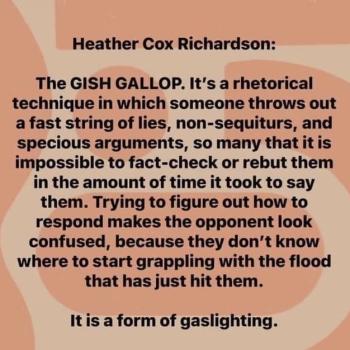Neil Carter has written such a detailed and insightful post about the history of conservative Evangelicalism and its effect in shaping the church of today, that it didn’t seem adequate to merely circulate a link to it on social media. Early in the blog post Neil writes:
[D]isregard for blacks, for immigrants, for women, and for the poor is woven into the fabric of white evangelicalism in ways they cannot see because it’s all about what their theology doesn’t say rather than what it does. It’s about what their theological tradition has eliminated from consideration over the course of their long and tumultuous history rather than what it actually speaks about explicitly.
Call it apophatic racism, if you will. Its shape doesn’t come from what is said, but from what is left unsaid.
Evangelicals often talk about sins of omission rather than commission, but their faith has become so individualized that they never think about what it means for an entire institution (e.g. the church, or a country claiming to be Christian) to be guilty of sins of omission. They only think about sin on an individual level, which leaves a giant void at the center of their political views.
After surveying key moments in the history of the interplay of religion, racism, and politics in the United States, including what Billy Graham said and didn’t say, did and didn’t do, in relation to Martin Luther King, Neil summarizes:
Simply put, there is no natural place for social justice within white evangelical theology. There’s nowhere to put it. At the place in their theology where it should be there is a gaping hole, a silence that screams volumes about what evangelical churches simply cannot be made to care about.
The impact of the historic dominance of and focus on white men is also summarized in a powerful way:
You simply cannot spend 150 years building a theology around the concerns of a single demographic and expect that theology to accommodate the needs of a diverse population. It won’t work. And in case you haven’t noticed, religions don’t easily change…
You don’t have to spell out racial preferences explicitly in order to instill them into your theology. All you have to do is allow historical and cultural developments to shape your thinking about a subject organically by disregarding the needs and challenges faced by everyone in the world except white males, and just keep doing that for centuries.
In time you will find a gaping hole in the place where a social conscience should be, and yet no one will notice it or remember how it got there. They will assume the Bible drove their theological emphases (because Jesus is coming soon!) rather than the deeply rooted racism and nativism of the groups of people who passed that theology down to them.
You almost have to get outside of that world entirely to see it for what it is. I know that’s how it worked for me. Which means I may be wasting my digital breath by spelling all this out. But there it is, anyway, in case anyone tries to say that nothing within the theology of evangelical Christianity makes you racist. I would suggest looking more at what’s missing rather than at what’s there.
You can see why I wanted to highlight this post, and share quotes at greater length than a tweet could ever allow for. Visit the Godless in Dixie blog to read the rest of what Neil wrote on this topic.
Meanwhile, on the Anxious Bench blog, Doug Rossinow talks with David Swartz about his book The Religious Left in Modern America. In that interview he says, “We argue that there really is a coherent religious left tradition in the United States since the time of heavy industrialization and urbanization, from the 1880s until the present. It is an extremely heterogeneous tradition. But it’s there…Basically, we argue that religion in modern American politics is definitely, absolutely not confined to the religious right! It never has been.” See also the post there about John Fea’s forthcoming book, Believe Me, about Evangelical support for Donald Trump. There is an excerpt from the book on the Christian Century blog.
Jon Meacham predicts a day of reckoning for Evangelical supporters of Trump: “They sold their souls for a Supreme Court seat, and they’ll have to decide whether it was worth it.” See also Fred Clark’s post about how his comments in 2011 sound today, and Vance Morgan on “America First” as a theological heresy.















